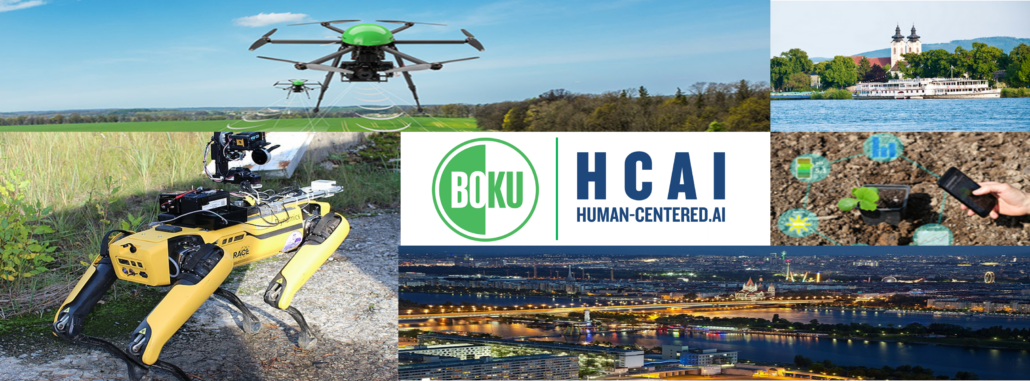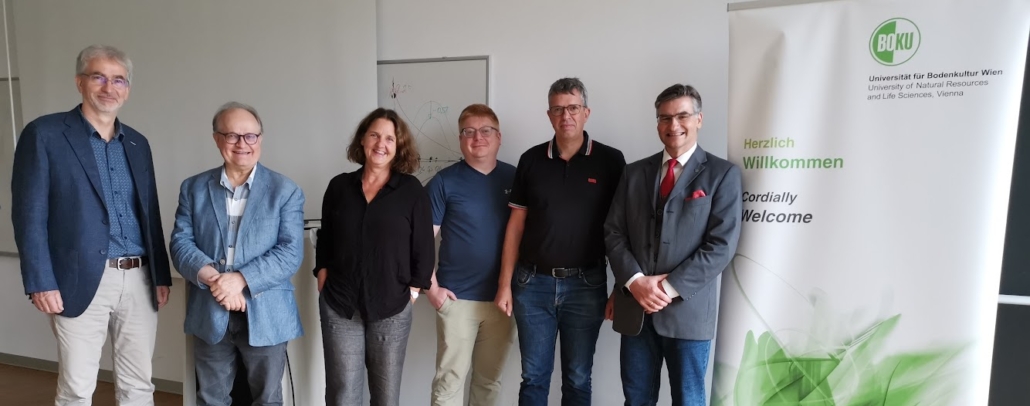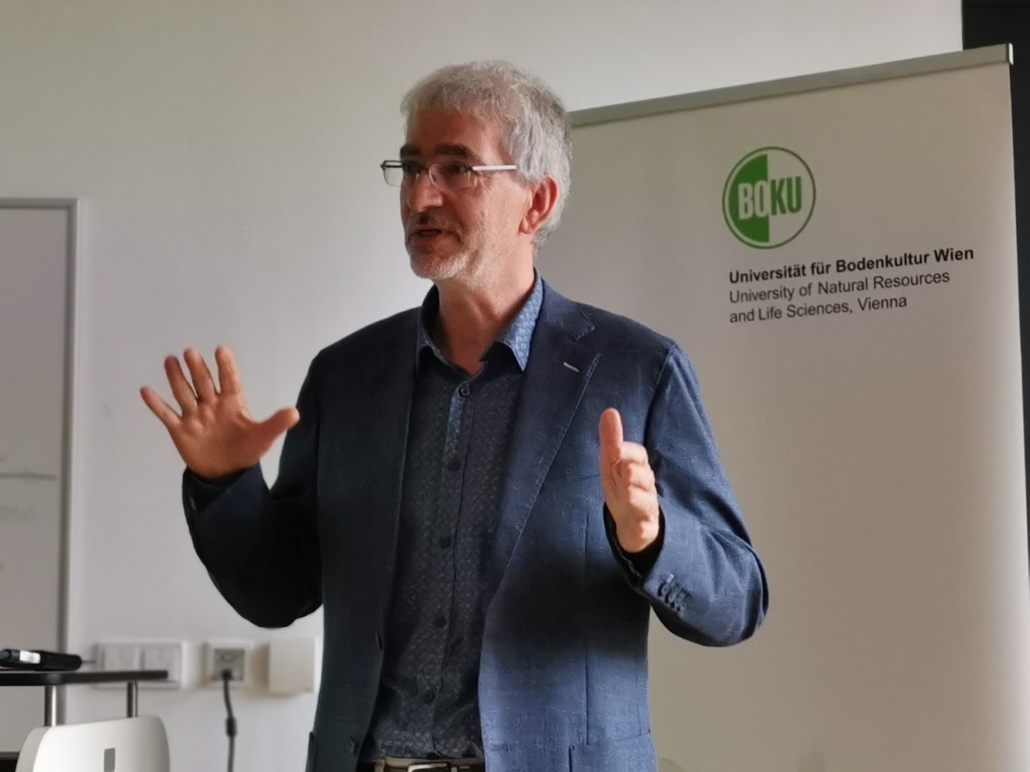HCAI-Lab Symposium “Digital Transformation for Smart Farm and Forest Operations”
When: Monday, August, 22, 2022 10:00 – 13:00
Where: UFT-Tulln, Konrad-Lorenz-Str. 24, A-3430 Tulln an der Donau, Lower Austria, Greater Vienna Area – [local map]
Take train REX 41 – 22 minutes from Heiligenstadt (08:10, 08:34, 09:10) to Tulln Bahnhof – exit to the south (Messe) and follow the signs Technopol Campus
Venue: UFT1-EG/507 Seminarroom 15 (ground floor)
Due to the Covid situation this is a non-public, per invite-only symposium, registration necessary.
The main impetus for the global effort of the current digital transformation in almost all domains of our daily lives is due to the great successes of Artificial Intelligence (AI) and in particular the workhorse of AI, statistical machine learning (ML).
The intelligent analysis, modeling, and management of agricultural and forest ecosystems, as well as the use and protection of soils, already play an important role in securing our planet for future generations and will become irreplaceable in the future. Technical solutions must encompass the entire value chains.
The process of digital transformation is supported by cyber-physical systems enabled by advances in ML, the availability of Big Data, and increasing computational power. For certain tasks, algorithms today achieve performance that exceeds human level performance. The challenge is to use multimodal information fusion, i.e., to integrate data from different sources (sensor data, images, *omics) and to explain to an expert why a certain result was obtained. However, ML models are often sensitive to even small changes, and perturbations can have dramatic effects on the outcome. Therefore, the use of AI in domains that matter to human life (agriculture, forestry, climate, health, etc.) has led to an increased need for trustworthy AI with two main components: Explainability and Robustness. One step to making AI more robust is to incorporate and leverage expert knowledge. For example, the forester in the loop can often bring experience and conceptual understanding to the AI pipeline. Human-centered AI (HCAI) is a synthesis of “artificial intelligence” and “natural intelligence” to strengthen, augment, and complement human performance – rather than replace humans.
The dramatic newspaper and television headlines about the increasing danger of forest fires, the threat to our forests from pests (e.g. bark beetle) and climate change, with the simultaneous importance of wood as a renewable resource underline the urgency of our issues and need for urgent help from the AI domain !
Most of all it needs a concerted effort towards “One Health”. URL of this page is https://bit.ly/3B3EV0E
Symposium Program
Session Morning 1, 10:00 – 10:45
Ute SCHMID (Head of Cognitive Systems Group, University of Bamberg, Germany)
Making Use of Human Knowledge in Machine Learning — Image-based Classification from Tissue to Trees
Abstract: For many practical applications of machine learning it is appropriate or even necessary to make use of human expertise to compensate a too small amount or low quality of data. Taking into account knowledge which is available in explicit form reduces the amount of data needed for learning. Furthermore, even if domain experts cannot formulate knowledge explicitly, they typically can recognize and correct erroneous decisions or actions. This type of implicit knowledge can be injected into the learning process to guide model adapation. In the talk, I will introduce inductive logic programming (ILP) as a powerful interpretable machine learning approach which allows to combine logic and learning. In ILP domain theories, background knowledge, training examples, and the learned model are represented in the same format, namely Horn theories. I will present first ideas how to combine CNNS and ILP into a neuro-symbolic framework. Afterwards, I will address the topic of explanatory AI. I will argue that, although ILP-learned models are symbolic (white-box), it might nevertheless be necessary to explain system decisions. Depending on who needs an explanation for what goal in which situation, different forms of explanations are necessary. I will show how ILP can be combined with different methods for explanation generation and propose a framework for human-in-the-loop learning. There, explanations are designed to be mutual — not only from the AI system for the human but also the other way around. The presented approach will be illustrated with different application domains with a special focus on health status of plants and trees.
Short Bio: Ute is a professor of Applied Computer Science/Cognitive Systems at University of Bamberg since 2004. She received university diplomas both in psychology and in computer science from Technical University Berlin (TUB). She received her doctoral degree (Dr.rer.nat.) in computer science in 1994 and her habilitation in computer science in 2002 from TUB. From 1994 to 2001 she was assistant professor at the Methods of AI/Machine Learning group, Department of Computer Science, TUB. After a one year stay as DFG-funded machine learning researcher at Carnegie Mellon University (CMU) working with Tom MITCHELL, Ute worked as lecturer for Intelligent Systems at the Department of Mathematics and Computer Science at University Osnabrück and was member of the Cognitive Science Institute. Ute Schmid is member of the board of directors of the Bavarian Institute of Digital Transformation (BIDT) and is a member of the Bavarian AI Council (Bayerischer KI-Rat). In 2022 she became elected as a EurAI Fellow. Since 2020 she is head of the Fraunhofer IIS project group Comprehensible AI (CAI). Ute Schmid dedicates a significant amount of her time to measures supporting women in computer science and to promote computer science as a topic in elementary, primary, and secondary education. She won the Minerva Award of Informatics Europe 2018 for her university. Since many years, Ute Schmid is engaged in educating the public about artificial intelligence in general and machine learning and she gives workshops for teachers as well as high-school students about AI and machine learning. For her outreach activities she has been awarded with the Rainer-Markgraf-Preis 2020. In 2022 she is a Visiting Professor at the University of Oxford.
https://www.uni-bamberg.de/en/cogsys/schmid
https://scholar.google.com/citations?hl=en&user=fJXIVKsAAAAJ
1-SCHMID-Ute-Human-in-the-Loop-Machine-Learning-2022-08-22 Slides [pdf, 2898 kB]
Session Morning 2, 10:45 – 11:30
Matthew E. TAYLOR (University of Alberta, Edmonton, Canada)
Reinforcement Learning in the Real World: Challenges and Opportunities
Abstract: Reinforcement learning (RL) showed great success, e.g., in the game of Go. Recent successes on important problems show that this mature technology can be useful in the real world as well. In this talk, we will highlight some of these successes, focusing on how RL is playing out in commercial environments and what problems remain to be solved before it is ready for deployment like many supervised learning technologies. In addition, it will be argued that RL, like all current AI technologies, is fundamentally a human-centered paradigm – that is, strictly speaking, a human-in-the-loop paradigm. This framework will help motivate why additional basic research on the interaction of humans and RL agents is critical to moving RL out of the lab and into the hands of non-academic practitioners and domain experts in applied fields.
Short Bio: Matt is a professor of computer science at the University of Alberta, heading the Intelligent Robot Learning Lab. He is also a Fellow and Fellow-in-Residence at Amii (the Alberta Machine Intelligence Institute). Matt received his PhD from the University of Texas at Austin in 2008, supervised by Peter STONE and was afterwards Post-Doc at the University of Southern California and an Assistant Professor at Lafayette College. He continued as professor for Artificial Intelligence at Washington State University at the college of Agricultural, human and natural resources sciences – where he is still affilated with. His current research interests include fundamental improvements to reinforcement learning, applying reinforcement learning to real-world problems, and human-AI interaction. His NEW book “Reinforcement Learning Applications for Real-World Data” co-authored with Philip Osborne from the University of Manchester and Kajal Singh from the University of Oxford, is aimed at practitioners without degrees in machine learning and has an expected release date of Summer 2022 – and hopefully some exemplars will be ready for personal signature during this symposium, see:
https://www.morganclaypool.com/doi/abs/10.2200/S01170ED1V01Y202202AIM052
https://scholar.google.com/citations?hl=en&user=edQgLXcAAAAJ
2-TAYLOR-Matt-Human-in-the-Loop-Reinforcement-Learning-2022-08-22 Slides [pdf, 3715 kB]
Session Morning 3, 11:30 – 12:15
Senthold ASSENG (Technical University Munich, Germany)
Abstract: Throughout history, societies have been challenged with how to produce sufficient food. Currently developing and developed countries struggle to achieve a wide range of food-related goals such as food and nutrition security, environmental sustainability, biodiversity, economic development and rural poverty alleviation (Godfray et al., 2010). These challenges have become increasingly global in scale with the development in international food trade. In addition, there is an increasing concern about the impact of global climate change on food production and its associated environmental, economic, social and political impacts (Godfray et al., 2010). More recently, the COVID-19 crisis and the Russian-Ukrainian war further highlight the risks of massive disruptions in the globalized food supply chains, unveiling an underlying vulnerability of agricultural systems. At the same time, the combination of advances in knowledge, technology, changes in consumer preference and low cost of manufacturing is accelerating the next technology revolution in food production systems. This will have major implications for how, where and by whom food will be produced in the future. This next technology revolution could benefit the producer through substantial improvements in resource use and profitability, but also the environment through reduced externalities. The consumer could ultimately benefit through more nutritious, safe and affordable food diversity, which in turn will also contribute to the acceleration of the next technology. The next technology revolution in food production systems will create new opportunities in achieving progress towards many of the Sustainable Development Goals, but it will require early recognition of trends and impact, public research and policy guidance to avoid negative trade-offs. Potential food system ‘game-changers’ include (1) Artificial intelligence linked with Big Data, sensors and food systems knowledge to increase productivity, optimize resource use and minimize externalities in food supply chains, (2) Autonomous acting technologies including robots and drones throughout the food supply chain, (3) Tailored genes for specific food production, nutritional and environmental outcomes, (4) Vertical farming with controlled-environment production of food. (After Asseng et al. 2021, Implications of new technologies for future food supply systems, The Journal of Agricultural Science 159, 315–319).
Short Bio: Senthold Asseng is a professor of Digital Agriculture and the Director of the World Agricultural Systems Center at the Technical University of Munich. He is a Member of the Scientific Committee of the Agricultural Model Intercomparison and Improvement Project – AgMIP and a co-leader of AgMIP-Wheat. His field of research is the analysis of atmosphere-crop-soil systems. His main research areas include impact of climate variability and climate change, cropping sustainability, food security, and how systems analysis and crop modelling can assist autonomous robot-managed cropping systems in the field and in fully-environmentally controlled indoor vertical farming. Senthold studied agricultural sciences and received his PhD at Humboldt University Berlin and his Habilitation at Technical University Munich. He was a Principal Research Scientist at CSIRO in Australia. He became a Full Professor in Agricultural and Biological Engineering at the University of Florida and the Director of the Florida Climate Institute. Sentholds research combines artificial intelligence methods to topics in agriculture and spans many scales from field to global. With a systems science approach, topics are considered multidisciplinary, combining agronomy, plant physiology, biology, soil science, plant nutrition, geography, agrometeorology, climatology, hydrology, artificial intelligence, computer science, statistics, robotics, and physics.
https://www.professoren.tum.de/en/asseng-senthold
https://scholar.google.com/citations?hl=en&user=8b_kldUAAAAJ
3-ASSENG-Senthold-The-Future-of-Food-Production-2022-8-22 Slides [pdf, 3465 kB]
Session 4, 12:15 – 13:00
Randy R.G. GOEBEL (Alberta Machine Intelligence Institute, Edmonton, Canada)
Prioritizing challenges in the application of AI to ecological management
Short Bio: Randy Goebel is a Fellow and Member of the Board of Directors at the Alberta Machine Intelligence Institute (Amii) and full Professor of Computing Science at the University of Alberta where he also holds the position of Associate Vice President of Research & Innovation, and Associate Vice President (Academic). He was one of four original founding researchers of Amii and currently is a Fellow and sits on the amii Board of Directors. He is also the interim Executive Director of the NRC/UAlberta Nanotechnology initiative, a member of the scientific advisory board of DFKI (Deutsches Forschungsinstitut für Künstliche Intelligenz – the German Institute for AI), the China Institute at the University of Alberta, and sits on the National Program Committee of the Pan-Canadian AI Strategy. He is also a scientific advisor to ROSS Intelligence (Toronto, CA), Intellicon (Seoul, KR), and AI Fred (Montréal, CA). Over his career, Randy has supervised more than 50 early-stage researchers at the MSc, PhD and Post-doctoral Fellow levels, and he has published more than 200 publications including refereed and invited papers and publications in books. He is a highly-regarded speaker, having delivered talks at academic conferences and institutions as well as businesses and governmental organizations around the world.
https://www.amii.ca/about/our-people/randy-goebel/
https://scholar.google.com/citations?hl=en&user=fTgRyn4AAAAJ
4-GOEBEL-Randy-Artificial-Intelligence-for-Forest-Operations-2022-08-22 Slides [pdf, 3697 kB]




